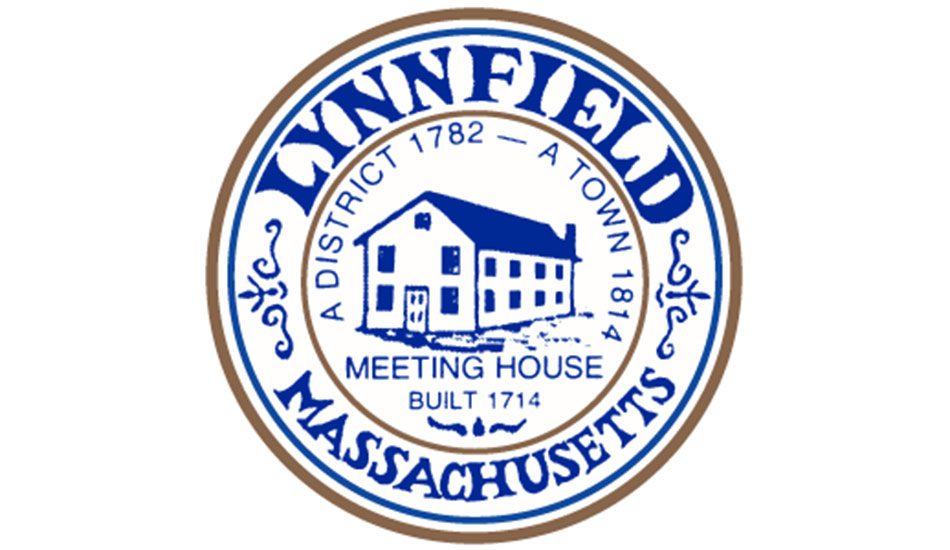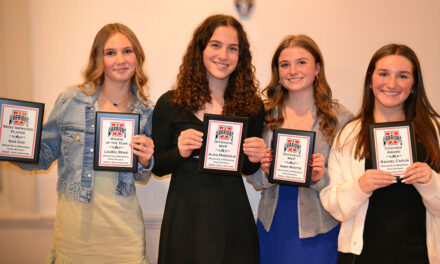By DAN TOMASELLO
LYNNFIELD — It’s almost showtime.
After a month-long delay, Fall Town Meeting will finally commence on Wednesday, Nov. 13, beginning at 7 p.m. in the Lynnfield Middle School auditorium. Similar to previous Town Meetings, a quorum of 175 voters is needed for the meeting to proceed.
Registered voters will be able to begin checking into Town Meeting at 6 p.m. on Monday. Electronic voting will be used once again.
Lynnfield Recreation will be offering childcare for Fall Town Meeting. In order to register, residents should visit https://lynnfieldma.myrec.com/…/program_details.aspx.
The Fall Town Meeting warrant includes just seven articles, but the chance for a short session is highly unlikely due to scheduled votes on two proposed debt exclusions and a zoning amendment related to the MBTA Communities law.
Debt exclusions
Fall Town Meeting will be voting on two debt exclusions pertaining to the Lynnfield Public Library renovation project and the Department of Public Works’ road construction program.
Article 5 pertains to the $18.3 million Lynnfield Public Library renovation project. The Select Board hired Tappé Architects last November to conduct a feasibility study that examined three different library renovation proposals while the Board of Library Trustees looked to get an extension from the Massachusetts Board of Library Commissioners (MBLC) for the rejected new library project. The LRC authorized Tappé Architects to develop a design for Option 3 this spring.
Tappé Architects Principal Jeff Hoover recently told the Select Board that the library renovation project includes constructing an addition at the back of the building where the HVAC units are currently located. He said the Children’s Room will be expanded as well. He said the main Reading Room on the first floor will be reconfigured in order to increase the library’s collections.
The library’s roof will be razed in order to expand the second floor. Hoover said the second floor will include an all-purpose meeting room and an enclosed Teen Room. He said a glass wall will be added to the Mezzanine in order to make it “acoustically separated.” Study rooms will also be added to the library.
Hoover said the renovation project will address ongoing maintenance issues such as electrical problems, roof leaks and water leaking into the basement.
“We are bringing the building up to code,” said Hoover.
DPW Director John Scenna recently told the Select Board that the library renovation project would cost the average home $208 per year.
“That full amount will hit taxes in January 2027,” said Scenna.
In addition to the library renovation project, voters at Fall Town Meeting will be asked to approve Article 6, which is a second debt exclusion for the DPW’s 10-year road improvement program, totaling $12,850,000 (see separate story).
“This would supplement existing funding sources,” said Assistant Town Administrator Bob Curtin during the Select Board’s Oct. 28 meeting.
If voters approve the DPW’s revamped road construction program, Town Administrator Rob Dolan said during a “Town Talk” episode that it will result in a “residential tax increase equal to $258 per house on an averaged assessed home for 10 years.”
Curtin said a two-thirds majority will be needed to approve Articles 5 and 6. If Fall Town Meeting approves both projects, a debt exclusion vote will take place on Tuesday, Jan. 6, 2025.
The Select Board unanimously voted to recommend the library renovation project and the road improvement program during Monday’s meeting.
MBTA zoning
In addition to the two debt exclusion votes, Fall Town Meeting will be asked to approve Article 4 that pertains to the MBTA Communities law.
Former Gov. Charlie Baker signed an economic development bill into law in February 2021 that amended the Zoning Act by requiring MBTA Communities to have at least one zoning district of reasonable size in which multifamily housing is permitted as of right. While the town does not have an MBTA station, the law classifies Lynnfield as an “MBTA adjacent community” because the town borders municipalities with MBTA stations such as Lynn, Reading and Wakefield.
The MBTA Communities law, also known as Section 3A, classifies Lynnfield as an “MBTA adjacent community” because the town borders municipalities with MBTA stations such as Lynn, Reading and Wakefield. Lynnfield, which is currently classified as being in “interim compliance,” is facing a Dec. 31 deadline to adopt a multifamily zoning district in order to comply with the MBTA Communities law.
The MBTA Zoning Committee has selected three overlay zoning subdistricts that will be brought to Fall Town Meeting on Wednesday, Nov. 13. The Massachusetts Executive Office of Housing and Livable Communities defines an overlay district as “a type of land use zoning district that lies on top of the existing zoning and potentially covers many underlying districts or portions thereof.”
Three of the proposed locations that would have overlay districts placed on them are MarketStreet Apartments, Michael’s Landing and Lynnfield Commons because those apartment complexes already exist. There are 200 units at Lynnfield Commons, 180 units at MarketStreet Apartments and 68 units at Michael’s Landing.
“We have quite a few locations that already meet the state’s guidelines for density, so the committee decided to put an overlay district on those projects that have already been built,” said Planning and Conservation Director Emilie Cademartori during Monday’s Select Board meeting.
Cademartori said the only portion of MarketStreet Lynnfield that would have an overlay district placed over it is the apartment complex. The rest of the outdoor mall is excluded.
Four other parcels located on an existing Herb Chambers dealership property and one parcel on a Kelly Automotive dealership property on Route 1 North are included as part of the Lynnfield Commons overlay subdistrict.
Cademartori said placing overlay districts over the three apartment complexes could result in 149 new units possibly being built. She said the law requires Lynnfield to rezone a total of 40 acres and 607 units.
“Of the units that have not been built, the dimensional requirements cap any project that could be built at two-and-a-half stories,” said Cademartori. “They have created a compliant bylaw that meets the requirements of the Zoning Act with minimal or no impact on the town. No one can predict what can happen in commercial real estate, but they have chosen parcels that are already very much in use and are high value real estate that they didn’t feel were likely to necessarily result in any units being built any time in the near future.”
Select Board Chair Dick Dalton said the five dealership parcels included in the Lynnfield Commons subdistrict “exclude the Fat Catcus and Donovan’s.”
Select Board member Phil Crawford expressed his support for Article 4.
“We are minimizing the impact on the town,” said Crawford. “I think it is a great plan and I fully support it.”
In response to a question from Select Board member Alexis Leahy, Cademartori said the town will be ineligible for state grants if Lynnfield is not in compliance with the law by Dec. 31.
“We were eligible for grant monies this year because we were considered to be in interim compliance,” said Cademartori. “If we do not comply by Dec. 31, any grants that are pending could potentially be retracted and we wouldn’t be eligible for new grants under certain programs. I suspect that failure to comply by this December could certainly have implications for the town.”
Dalton noted that the MBTA Communities law’s compliance guidelines reference 12 grants while the legislation originally listed three that would be “in jeopardy.”
Cademartori explained that not complying with the law could affect all state grants.
“It now says when you sign the contract, you must be compliant with all state law,” said Cademartori about state grant contracts. “That is just state standard contract language now. So even though it is not in the legislation, it could impact all grants. We don’t know yet.”
Leahy asked if the state could potentially “choose the locations” of the MBTA Communities zoning districts if Fall Town Meeting rejects Article 4.
Cademartori said that situation is a “possibility.” She said there are 15 towns whose town meetings previously rejected complying with the law that are trying again this fall. Wakefield is one of those communities.
“If they fail, we have been told there is a potential the state will choose the district locations for those towns,” said Cademartori.
The Select Board unanimously voted to recommend Article 4 on Monday. The Planning Board recently voted to recommend the warrant article.
Additional warrant articles
In addition to the three big warrant articles, Fall Town Meeting includes four other articles.
Curtin said during an Oct. 28 Select Board meeting that Article 3 will request that Fall Town Meeting approve transferring $905,000 from the Recreational Capital Trust in order to replace the turf field at Pioneer Stadium at Lynnfield High School (see separate story).
The Select Board unanimously voted to recommend Article 3.
Curtin said Article 1 will ask Fall Town Meeting to approve transferring funds to pay overdue bills from a prior fiscal year.
“The town accountant is compiling that list, and she expects there will be some,” said Curtin.
Curtin said Article 2 will request Fall Town Meeting to approve transferring funds to supplement certain accounts in the town’s current fiscal year 2025 operating budget.
The Select Board held off making recommendations on Articles 1 and 2 during Monday’s meeting. The Select Board will be making those recommendations before Fall Town Meeting.
Curtin said Article 7 seeks to ask Fall Town Meeting to approve amending the General Bylaws’ fees for the sealer of weights and measures. The Select Board unanimously voted to recommend Article 7.
“This has not been changed in decades,” said Curtin. “Our sealer of weights and measures, who also serves Peabody, took a look at what Peabody does as well as other towns. He has suggested a revision to our fee schedule.”





